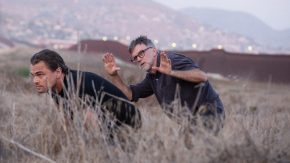Béla Bartók at the bus stop
As my mind went for a walk under the blanket of night, it came across an old acquaintance. He was sitting cross-legged, grey and avuncular in a bus stop pavilion, smoking a cigarette. His mouse-coloured eyes shared the look of those who see the light of day on the banks of the Aranka River, yet when the hungry disease finally eats them from the keyboard, the echo of “My thoughts and prayers are with you” rustles in the sobbing wife’s ears.
I live on the street named after you! I addressed these words to him, after the realisation had set in, he was squirming on the bus stop bench. He continued to sit, unresponsive. With the dignified contempt that only the monochromatic discipline of a dead man summoned from a dream can show. The impudent ash at the end of the cigarette seemed to swell, it was as, if not condemned to an immediate puff, it might damage the morose ghost’s attire. As if the Sphinx had risen from his ancient slumber, the gesture was so impressive as he struck the annoying combustion product into nothingness with his index finger. I was already sitting beside him, no doubt disturbing his spiritual sphere, but he took no notice of me, just as he would have seemed to resent the fact that he had been torn from the spirit world by some whimsical association of feelings.
Then it dawned on me that I was not familiar with the etiquette of the dead. It must have prompted me to the indecency of putting down my deceased fellow human being. I thought there was no turning back, that it would be useless to explain. I wanted to make him talk by the content of the subject rather than by the manner of his presentation. The failure of my efforts to do so had thrown my wandering imagination into a desperate rage.
I thought of the lusty satisfaction of pulling an Ipad with a piano simulator from my bag and rubbing it in his face. Maybe, he would look on it with the same contempt mixed with humility as the last Greek looked on the first Roman, who brought the legal system instead of poetry and bowled with the tanagrams, maybe not. Then I felt sorry for Béla Bartók. As I pitied the humanity, music critic, cadential sequenc, Emerson Lake and Palmers commemorating Allegro Barbaro. If it feels good to bombard the piano keys with extended 7 chords to the rhythm of Bulgarian folk music, let it ring. I want to love you, Béla, and not only because to adore your music, which is at once vast and meticulous, unpretentious and precise, simple and chiselled, and therefore music of the human being, is the musical aesthetic duty of every well-meaning boor in our century.
Then I pressed a kiss to his stiffly stretched, grey forehead and let him return to his own.


























Comments